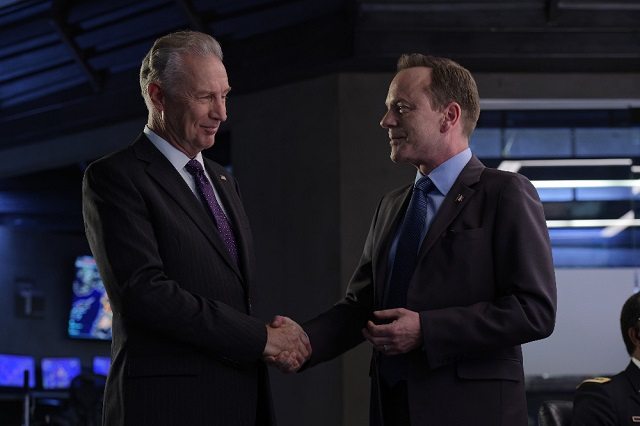'Designated Survivor' Review: "Commander in Chief"

Michael Simon ’19 / Emertainment Monthly Staff Writer
After a bit of a rocky episode following the dramatic demise of Peter and Beth MacLeish, Designated Survivor was back in full force this week with an installment that served as a great reminder of how well this show juggles plot points, old and new. The debut of new characters as well as the reemergence of some old faces and names helped to get this show on firm ground before moving forward into the remainder of the season.
First and foremost, the arrival of former-President Cornelius Moss (Geoff Pierson) is perhaps the best character introduction that this show has delivered thus far, and that is a big statement to make. Among all of the noble agents, sleazy politicians, and maniacal traitors that this show has introduced into the mix, none has hit the screen with quite as much flair and resonance as Moss does. Moss is capital-P Presidential, and manages to even make President Tom Kirkman (Kiefer Sutherland) look small by comparison. Now, this is not to say the Sutherland did not deliver in this episode, but rather quite the contrary, as this episode provides some of Kirkman’s greatest character development to date.
This character development is so important because it comes about as a result of Moss serving as one of the first characters in the series that challenges Kirkman intellectually and philosophically, and yet is not positioned as a full-blown antagonist. Moss is the type of catalyst that Vice President MacLeish (Ashley Zuckerman) could never be. It makes the budding relationship between Moss and Kirkman incredibly interesting to watch, because we can already see Kirkman learning a lot from his predecessor. Whereas MacLeish was an obstacle that needed to be moved out of the way sooner or later, Moss is an advisor and confidant who won’t pull any punches when it comes to giving Kirkman his honest opinion.
Moss’ brutal honesty provided the viewers with some much needed perspective, as he posed the idea that perhaps Kirkman really isn’t handling his new responsibility as well as he ought to be. Now of course, Kirkman’s new “responsibility” is one of rather astronomical proportions – he has been dealt an impossible task. But for the first time, Moss argues that Kirkman is not truly a President of action, but one of reaction, as his Presidency thus far has been marked by a string of responses to crisis after crisis, rarely preventing the crises in the first place. As Moss and Kirkman work together throughout the course of this episode with the conflict in Naruba, we see this trend slowly changing, as Kirkman takes steps to prevent further conflict in the war-torn country. While the Naruba plot itself may be pretty forgettable, it manages to serve as a solid vehicle for showcasing Kirkman’s changing dynamic now that he has Moss at his side.
Shifting focus back to the underlying conspiracy at play in Designated Survivor, this episode saw the return of the mysterious case of Chief of Staff Charles Langdon (Peter Outerbridge); a character from whom we have seen very little since he was dramatically revealed to be alive in the mid-season finale. Going into this episode, it was all but certain that Langdon was quickly going to become the new main antagonist, filling the role of the recently deceased MacLeish couple. Instead, Designated Survivor does not allow Langdon to be reduced to a cliché of a character and gives him real depth and story, revealing that he is just as afraid and confused as the rest of the characters. Granted, Langdon’s cluelessness and cowardice does make it hard to sympathize with him, but he certainly isn’t unlikable.
Now, while Langdon succeeds in becoming a new and interesting presence on the show, he still has not filled the void left behind now that the show is without an explicit antagonist. Instead, the majority of the main conflict is once again shrouded in mystery as we, the viewers, are left with more questions than answers. For now, all fingers point to the mysterious woman who seems to have been pulling the strings behind the scenes since the very beginning, infiltrating and manipulating every element of this all-encompassing conspiracy. The stakes were raised even higher this week as the situation became more personal than ever with the revelation that Kirkman was chosen as the designated survivor intentionally.

It is from this idea that the episode’s strongest element becomes most apparent – the idea that Kirkman might not be as heroically perfect as he’s appeared to be thus far. Combine the conspirators desire to have him as leader with President Moss’ views on his weak presidency thus far, we are left with a rather broken picture of our protagonist. Up until this point, Kirkman’s strong leadership has always been a given factor on Designated Survivor, but now that it’s been called into question, it has earned a newfound appreciation. Knowing that so many people are either highlighting his weaknesses or trying to orchestrate his failure, those of us cheering for his success have a much greater stake in the show.
That’s what it all comes down to on this week’s Designated Survivor: ever since the beginning, we have been rooting for President Kirkman simply because he was the likable protagonist. He was an unassuming man who had the burden of a lifetime dumped upon his shoulders. Now, something has changed. Now that we know that someone specifically put him at the center of this tragedy, the feeling has changed. Now that everyone, right down to the former President himself, is questioning his ability to lead, the mentality has changed.
To put it quite simply: now it’s personal.
Episode Grade: A